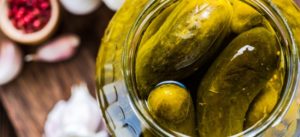Pickles are easy to make using just a few ingredients, but the way you make them indicates the type of pickle you will get. Fermented pickles in particular can be a great fermented food choice.
While we know that the combination of acid, spices and, in some cases, sugar creates the cucumber-based food called the pickle, choosing what type of pickle you want to make is your first step. Fermented pickles, or lacto fermented pickles, require a curing process that usually takes a few days to a few weeks. This is the time when fermentation takes place, creating a good bacteria commonly sought after for the probiotics it contains.
Now, the fresh-pack style may be used to produce whole cucumber dill pickles, cucumber slices and bread-and-butter pickles that you pick up at the grocery store, but these type of pickles don’t have the same probiotic benefits without the fermentation process. That’s why fermented pickles are perhaps the best pickle option out there. Let’s see exactly what benefits fermented pickles provide.
Benefits of Fermented Pickles
- Aid Weight Loss
- Support the Central Nervous System
- Benefits Skin
- May Help Reduce the Risk of Parkinson’s
- May Help Prevent Colorectal Cancer
- Treat Candida Symptoms
- Can Help Reduce Anxiety and Depression
1. Aid Weight Loss
According to a 2014 study published in the British Journal of Nutrition, good bacteria in the gut may help with weight loss, and since fermented pickles are potent probiotic foods, they can aid weight loss as well.
In a double-blind, placebo-controlled, randomized trial, researchers examined the effects of probiotic supplementation on weight maintenance and weight loss in obese women and men for 24 weeks. What they found is that over the course of the 24 weeks, the beneficial probiotic group was able to maintain a healthy weight, in particular women. In fact, researchers concluded: “The present study shows that the Lactobacillus rhamnosus CGMCC1.3724 formulation helps obese women to achieve sustainable weight loss.” (1)
2. Support the Central Nervous System
The microbiome, a blend of symbiotic bacteria in the intestines, needs to maintain a healthy state to be effective. To do that, it needs to the right probiotics. This helps maintain a strong digestive system. When the gut is healthy, the body receives the right signals from the brain.
3. Benefit Skin
Our skin contains quite an environment for microorganisms, giving way to the need for good skin health. Cleansing the skin properly is definitely important, but providing the proper environment for the skin to be at its best is important too. Part of that good health comes from probiotics.
While they can be applied topically, the probiotics that you consume affect skin health too. For instance, according to research published in the journal Beneficial Microbes: (3)
Probiotics as well as resident bacteria can produce antimicrobial peptides that benefit cutaneous immune responses and eliminate pathogens. Nutritional products containing prebiotics and/or probiotics have a positive effect on skin by modulating the immune system and by providing therapeutic benefits for atopic diseases.
Since fermented pickles offer a good bit of probiotics, this makes them a good choice as part of a healthy skin regimen.
4. May Help Reduce the Risk of Parkinson’s
Researchers have known for a long time that there is an association between a healthy gut and Parkinson’s disease. A 2017 study has given even more reason to ensure a healthy gut. The study, conducted at the University of Alabama, focused on 197 patients who had Parkinson’s and compared the results to 130 healthy control subjects. The findings showed that the Parkinson’s disease subjects had way more gut bacteria that was disrupting the normal microbiome than that of the control group. What’s even more important is that the species that helps remove toxic chemicals from the body was very low. So basically, they had very little protection. (4)
Additionally, a healthy gut helps provide important neurotansmitters, such as dopamine and serotonin, but if this is low, it can increase the risk of Parkinson’s. This can cause the deterioration of motor movement and coordination. (5)
5. May Help Prevent Colorectal Cancer
Colorectal cancer is the second leading cause of cancer-related mortality in the U.S. Studies are being conducted to help understand the role of probiotics and cancer. Using in vitro and animal models, strains have been reviewed to better understand their role in the gut flora. According to these studies, it appears consuming a healthy diet rich in probiotics has potential to help prevent colorectal cancer. This is good news in terms of preventive methods for the possible prevention of cancer. Though more studies are needed, particularly in human trials, this is positive news and evidence that a healthy gut flora may offer preventative measures for cancer prevention. (6, 7, 8)
6. Treat Candida Symptoms
Probiotics found in fermented pickles may help reduce candida symptoms. A study from the Military Medical Academy’s Department of Gynecology in Bulgaria focused on therapy for vaginal C. albicans infections using a probiotic treatment. The study conducted include 436 women who had vaginal candida. Of those women, a group of 207 was given specific bacteria, along with a second group of 209. After five days, 10 women were administered a vaginal probiotic. Complaints decreased in the 10 women, and results indicate that this treatment may prevent relapse as well. (9)
7. Can Help Reduce Anxiety and Depression
Studies indicate that healthy probiotics found in fermented foods can help reduce anxiety and depression.
For instance, research out of the University College Cork’s Alimentary Pharmabiotic Centre in Ireland notes that: (10)
Recent studies published in this Journal and elsewhere demonstrate that there is a distinct perturbation of the composition of gut microbiota in animal models of depression and chronic stress. This has direct implications for the development of psychobiotic-based therapeutic strategies for psychiatric disorders.
Furthermore, research published in the journal Psychiatry Research looked a previous studies and self-reported measures of young adults on fermented food consumptions, neuroticism and social anxiety. Researchers concluded after examining all the results that “taken together with previous studies, the results suggest that fermented foods that contain probiotics may have a protective effect against social anxiety symptoms for those at higher genetic risk, as indexed by trait neuroticism.” (11)








